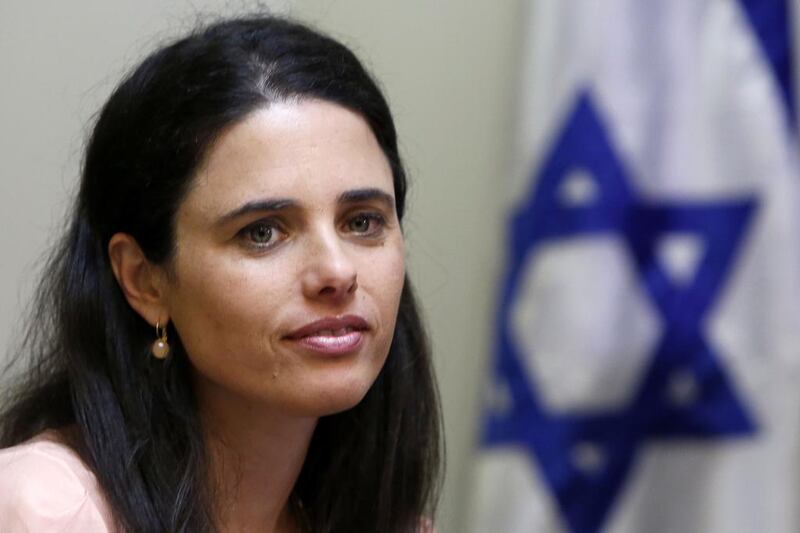JERUSALEM // A woman the Turkish president Recep Tayyip Erdogan once compared to Adolf Hitler was sworn in on Thursday as Israel’s new justice minister.
Ayelet Shaked’s selection for the post followed a desperate scramble by Benjamin Netanyahu, seeking a fourth term as prime minister, to forge a ruling coalition ahead of a May 6 deadline.
Her Jewish Home party, which advocates annexing the majority of the West Bank into Israel and opposes Palestinian statehood, won eight seats in the March 17 elections, enough to deliver Mr Netanyahu a government with a single-seat majority in the Knesset. Naftali Bennett, the Jewish Home leader, prolonged negotiations with the prime minister’s Likud party — threatening to send Israel back to the polls — to obtain Ms Shaked’s appointment. Critics have labelled the new government, composed of right-wing and religious parties, as the most extreme in Israel’s history, and Ms Shaked is drawing the sharpest criticism.
In contrast with the previous justice minister, Tzipi Livni, who led the last round of peace talks with the Palestinians, Ms Shaked once described any agreement with the Palestinians as “national suicide” for Israel.
Last year, the 39-year-old was accused of inciting racial hatred after posting an excerpt from an article by settlement movement leader Uri Elitzur, on Facebook. It labelled Palestinian children “little snakes” and described “the entire Palestinian people … [its] elderly and its women, its cities and its villages, its property and infrastructure” as the enemy and legitimate targets.
The post was published on June 30, the day the bodies of three murdered Israeli teenagers were found in the West Bank after a weeks-long search. The following day Mohammed Abu Khdeir, a 16-year-old Palestinian from East Jerusalem, was burnt alive by Israeli extremists and Ms Shaked deleted the post. Responding to criticism, which included Mr Erdogan’s Hitler comparison, she claimed it had been taken out of context.
“The face of a new form of racist, discriminatory Israel has been revealed,” Saeb Erekat, the Palestinian Liberation Organisation’s chief negotiator with Israel, said after Ms Shaked’s appointment was announced. “The presence of the extremist [Ms Shaked], of the ultra-Orthodox and of settlers in the government is proof that it’s a government of war, and against peace and stability.”
With only two years of parliamentary experience and no legal training, many have questioned Ms Shaked’s appointment as justice minister. Added concern stems from her previous efforts to advance legislation and measures that undermine democratic institutions in Israel and further marginalise the country’s Palestinian and Arab populations.
The justice minister assists the prime minister in selecting the attorney-general and chairs the selection committee appointing judges to the supreme court. Three new justices will be appointed in 2017 and one in 2018, and Ms Shaked will likely seek to select her preferred candidates. She previously described the selection of judges as unbalanced in favour of liberal activists.
The supreme court is considered by Israeli nationalists as a bastion of liberalism, occasionally preventing the unchecked advancement of Israel’s colonisation of the West Bank and East Jerusalem by ordering the removal of buildings constructed on privately owned Palestinian land. Ms Shaked advocates a reduction in the court’s powers to allow parliament to override its rulings on laws deemed unconstitutional.
"There needs to be changes in the system," she told the Haaretz newspaper in December. "This doesn't mean weakening it, it means balancing between the branches [of power]."
Ms Shaked is a vocal supporter of so-called “Jewish state” legislation, which would prioritise the Jewish character of the Israeli state over democratic institutions. She is expected to support a reintroduction of the proposals, criticised as further disenfranchising Israel’s Palestinian population, after they were voted down in the Knesset last year.
Non-profit organisations opposed to Israel’s nationalist and settlement movements also drew Ms Shaked’s ire last year when she attempted to bring legislation limiting donations from overseas.
"The battlefield of public diplomacy is far more important today to the existence of the State of Israel than a tank battalion or an Apache squadron," she wrote in an opinion piece for Haaretz, going on to describe Israel's political left as "delusional".
After serving in the Israeli army, Ms Shaked worked in IT before joining Mr Netanyahu’s office in 2006, when he was opposition leader. There she worked alongside Naftali Bennett. The pair resigned in 2008, later joining Jewish Home, following a reported dispute with Mr Netanyahu’s wife Sara.
She began work at a right-wing advocacy group and led a successful divestment campaign against Bank Leumi, one of Israel’s largest financial institutions, after discovering its role in the sale of a Jerusalem property company to a consortium including a Palestinian investor.
In 2012, during a television interview, Ms Shaked was asked if she hoped her fighter pilot husband was bombing Arabs. She laughed before replying, “Yes.”
Israeli moderates hope Mr Netanyahu’s flimsy 61-59 Knesset majority will limit Ms Shaked’s influence, with only two dissenting coalition parliamentarians required to frustrate any contentious legislation.
foreign.desk@thenational.ae





